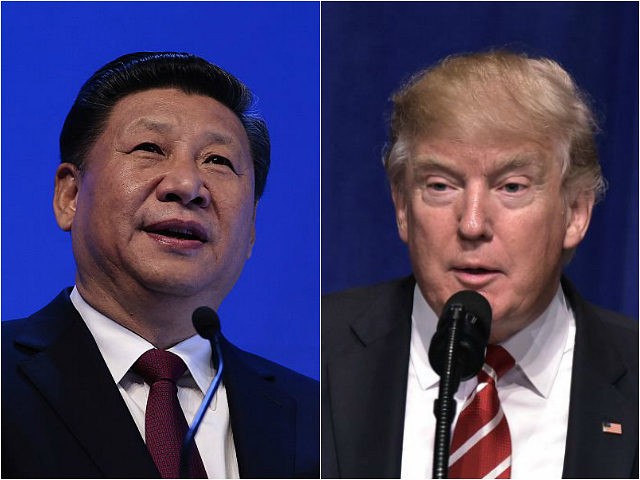President Donald Trump sent a letter wishing his Chinese counterpart Xi Jinping a happy Lunar New Year and extending his well-wishes to the Chinese people on the occasion of the Lantern Festival, the first one-on-one communication between the two world leaders.
In the letter, “President Trump stated that he looks forward to working with President Xi to develop a constructive relationship that benefits both the United States and China,” according to an official White House statement. The letter also congratulated the Chinese people generally on two major holidays: the Lunar New Year and the upcoming Lantern Festival. The Chinese Foreign Ministry later confirmed the letter thanked President Xi Jinping for having congratulated Trump on his inauguration in January.
NBC News notes that this is the first time President Trump has communicated personally with Xi as president.
“We highly commend President Trump for his festive greetings to President Xi Jinping and the Chinese people,” Foreign Ministry Spokesman Lu Kang told reporters during the ministry’s daily press conference on Wednesday. Lu’s response to a question regarding the letter was largely favorable to President Trump and the United States in general. “China will work with the US, in the principle of non-conflict, non-confrontation, mutual respect, and win-win cooperation, to expand cooperation, manage differences, and strive for greater achievements in our bilateral relationship by ensuring its healthy and sound growth,” he said.
Reporters attempted to goad Lu into condemning Trump’s letter, either for addressing the Lunar New Year after it had occurred or referring to the president’s upcoming meeting with Japanese Prime Minister Shinzo Abe, a longtime Beijing rival. Lu responded to the former by telling the report they had “read too much into it” and suggesting “you learn more about the significance of the Lantern Festival in traditional Chinese culture” to understand why President Trump would choose that occasion for a greeting.
The state publication Xinhua, in their write-up of the press briefing, noted, “Lantern Festival, which falls on Feb. 11 this year, is held to mark the first full moon of the new lunar year. It falls on the 15th day of the first lunar month. Chinese people consider it to be one of the country’s most important holidays.”
In support of Lu’s unusually warm regards to President Trump, Foreign Minister Wang Yi told reporters he was optimistic about economic ties between the two countries on Wednesday. “The China-U.S. ties have never ceased development, overcoming various difficulties,” he said, according to Xinhua. “Almost every state in the U.S. has been doing business with China, every (U.S.) university has cooperated with China and the number of personnel exchanges between the two countries has risen to more than four million last year.”
The Foreign Ministry’s public attitude to Trump diverges significantly from the belligerence that has defined Beijing-controlled publications’ coverage of Trump. The Communist Party-run Global Times, for example, has accused Trump of causing “total chaos” in the United States and exposing “the fragility of Western democracy.” The People’s Liberation Army has used its media channel to warn that Trump has made the possibility of a U.S.-China war “more real” and a “practical reality.”
Trump won election to the nation’s highest office on a campaign that emphasized reassessing America’s economic relationship with China, as well as promising to confront China’s growing colonization of international waters in the South China Sea. Since assuming the presidency, Trump has ensured his administration remain consistent with his campaign promises.
“If those islands are, in fact, in international waters and not part of China proper, yeah, we’ll make sure we defend international interests from being taken over by one country,” Press Secretary Sean Spicer said in January in response to reports that China has expanded its military capabilities in Vietnamese and Philippine territory in the South China Sea. During his confirmation hearing, Secretary of State Rex Tillerson promised to “send China a clear signal that, first the island building stops, and second, your access to those islands is also not going to be allowed.”

COMMENTS
Please let us know if you're having issues with commenting.